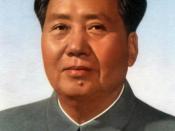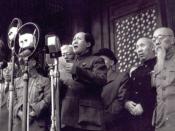In 1958 the Chinese communist party launched the Great Leap Forward campaign under the new "General Line for Socialist Construction." Mao Zedong(leader of China) promised the People's Republic that within fifteen years China would exceed Great Britain in the production of major products. Although evidence is vague, Mao's decision to introduce the Great Leap Forward was based in part on his concern about the Soviet policy of economic, financial, and technical assistance to China.
The Great Leap Forward was aimed at accomplishing the economic and technical development of the country at a much faster pace and with greater results. A new plan called "the people's communes" centered on a new socioeconomic and political system created in the countryside and in a few urban areas. It also set very high goals for increases in basic products such as iron and steel. These goals were unrealistic and the plan lacked sufficient planning.
The Chinese Communist Party called upon all Chinese to take on physical labor to transform the economy. This forced more than one hundred million people into projects. To encourage industry, small steel and iron-making furnaces were set up in the countryside. Large factories could not get enough of the raw materials they needed. Many problems made clear that the high goals set could not be accomplished. The communes, which were the size of towns, combined farmland and laborers of one whole district into a unit. The individual commune was placed in control of all production and was to operate as the sole unit; it was subdivided into the production brigade, and the production team.
By the fall of 1958, about 750,000 agricultural producers' cooperatives, had been combined into about 23,500 communes. Each averaged 22,000 people. Each brigade had certain jobs too. Each commune was planned as a self-supporting community for...


